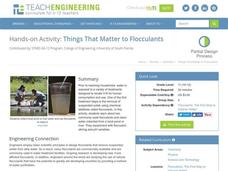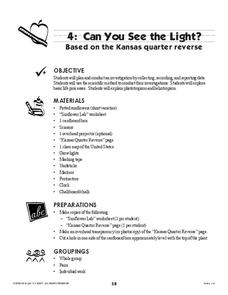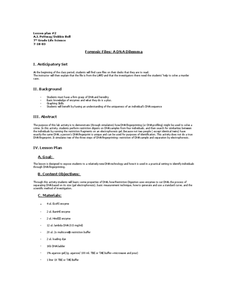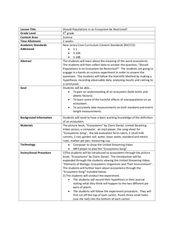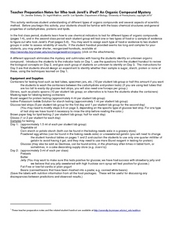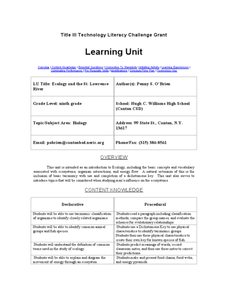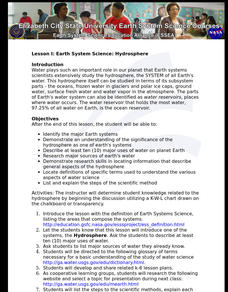Teach Engineering
Things That Matter to Flocculants
How does the dirt get out of your drinking water? A hands-on activity introduces the use of flocculants to help clear solid particles out of water. The plan walks learners through the process of setting up an experiment that...
Curated OER
Can You See the Light?
Explore plants and flowers with this lesson plan. Learners talk about plants, conduct an experiment with suflowers, and track a plants growth. This is a motivating way to present this concept.
Curated OER
"Lucky Charms": Interpreting Data and Making Predictions
Seventh graders determine if a "lucky charm" will increase their chances of winning a game. Students calculate the experimental probability of each player in a game. They observe and collect data from each activity. Students compare the...
Curated OER
Forensic Files: A DNA Dilemma
Seventh-graders come in to science class to find a file on their desks detailing a crime to be solved! As a demonstration, you simulate the restriction of DNA samples and separate them by electrophoresis. From the gel, learners can...
Curated OER
Blood Typing Investigation
Students role-play a scenario in which a car crash patient is inadvertently given the wrong blood type during a transfusion. They perform blood typing and explore the genetics behind ABO and RH blood types using simulated blood.
Curated OER
Renewable Energy in Connecticut - Softening Our Footprint through Sustainable Energy Use
Learners explore energy conservation. In this environmental lesson plan, students will look at data showing the amounts of energy used, our carbon footprint, and will research a power source. This unit allows for a deeper understanding...
Curated OER
Marine Life Research and Persuasive Conservation Pamphlet
Tenth graders examine conservation and research a type of fish that is under environmental stress. For this conservation lesson students create a pamphlet about the conservation of a marine organism.
Curated OER
Simple Machines: The Wede & Lever
Young scholars describe how wedge and lever makes work easier. In this physics lesson, students analyze experimental data by creating a graph to see the trends. They calculate the work done and mechanical advantage of these simple machines.
Curated OER
Predicting the Future
Young scholars examine how scientists predict the effects of global climate change. In this environmental science lesson, students participate in a discussion about using computer generated data to create climate predictions. Young...
Curated OER
Should Populations in an Ecosystem be Restricted?
Fourth graders experiment to determine how overpopulation effects ecosystems specifically plants. In this ecosystem instructional activity, 4th graders conduct an ecosystems experiment after listening to Claire Daniel's, Ecosystems. They...
Curated OER
Scale Drawings of Birds
Students create their own copies of Phoenix Birds using a grid system.
Curated OER
Assessing Risks for Inhalation and Ingestion of Pollutants
High schoolers use a hypothetical scenario to investigate inhalation of an airborne pollutant and ingestion of a waterborne pollutant. They work in pairs, investigating differences in overall exposure to contaminants by calculating...
Curated OER
The Environment
Students explore the issues that influence our environment and research ways to decrease the negative impact that humans have on the environment. Misconceptions about environmental issues are addressed in this lesson.
Curated OER
Modeling Mania Math Topic: Using Models
Students examine problem solving techniques when working on spatial problems. They discover how models, sketches, and drawings can be used to understand on something works. They design a model of a bridge using given dimensions and...
NOAA
A Day in the Life of an Ocean Explorer
What's life like aboard an ocean exploration vessel? Junior oceanographers examine the important role of communication in ocean research in lesson two of a five-part series from NOAA. The materials introduce the class to life on...
Curated OER
Pond Ecology
Fifth graders examine pond ecology, testing how temperature affects the respiration rate of fish. They collect various living things found at a pond, and identify the animal and plant life discovered. They observe a pond community in an...
Curated OER
How Does the Moon Affect Tidal Range?
Eighth graders study the phases of the moon. In this tides lesson students use the Internet to retrieve information.
Curated OER
A Rising People: Ben Franklin and the Americans
Young scholars examine the Enlightenment Era and its philosophies, including philosophers. Students gain an understanding concerning what they new science was and what it led to through a series of lessons and a PowerPoint. the end by...
Curated OER
Chemical and Physical Changes
Eighth graders investigate different gas behaviors. In this chemistry lesson, 8th graders describe how changing volume and temperature affect gas particles motion. They collect data and make a generalization about these variables'...
Curated OER
The Acoustics House
Students study how drums produce sound by building and playing a simple drum. They measure the diameter of their can, then mark a circle two inches larger in diameter on their piece of plastic with the marker or chalk, and cut out the...
Curated OER
Finding Wind Direction
Students identify the wind direction. In this weather activity, students use a weather vane to find the wind direction. Students complete a worksheet.
Curated OER
Who Took Jerell's iPod?
High schoolers investigate various substances to determine the perpetrator of a crime. In this biology lesson, students test for the presence of organic compounds in various samples. They identify an unknown substance based on its...
Curated OER
Ecology and the St. Lawrence River
Ninth graders complete a unit of lessons on ecosystems, organism interactions, and energy flow. They create a key for known species of fish, diagram the movement of energy through an ecosystem, and create and present food chains and food...
Curated OER
Earth System Science: Hydrosphere
Students identify the major Earth systems, and describe at least ten major uses of water on planet earth. They research major sources of earth's water, and describe general aspects of the hydrosphere.
